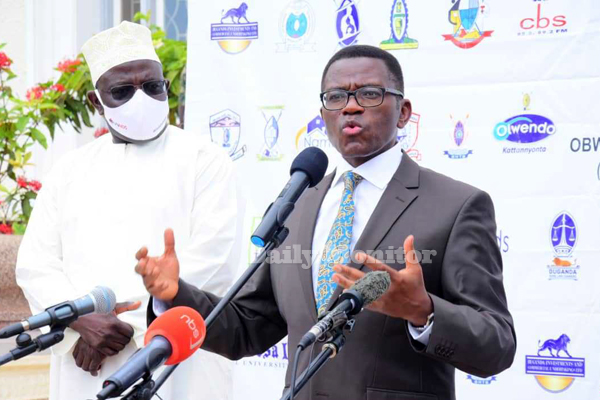Mengo speaks out on Mailo Land tenure

The Katikkiro of Buganda, Charles Peter Mayiga addressing journalists in Kampala on April 16, 2021. PHOTO/MICHAEL KAKUMIRIZI
What you need to know:
The kingdom’s views were derived from what Mr Mayiga called historical and contemporary context of land allocation, land tenure and management in Buganda before and after Uganda’s Independence
Authorities in Buganda Kingdom yesterday rejected government plans to dismantle the land laws, and maintained that the current conflicts are not triggered by Mailo Land system but other factors.
Mr Noah Kiyimba, the kingdom spokesperson and information minister, cited the factors presented by Katikkiro Charles Peter Mayiga when he appeared before the Bamugemereire Commission on April 25, 2018.
“We have not received the latest talk about the Mailo Land tenure but we stick by what was presented by the Katikkiro to the Bamugemereire-led commission,” Mr Kiyimba said.
The kingdom’s views were derived from what Mr Mayiga called historical and contemporary context of land allocation, land tenure and management in Buganda before and after Uganda’s Independence.
The Kingdom indicated that abolition of the Mailo Land tenure and its fusion into other tenures within a single tenure contrary to Article 237 of the Constitution raises suspicion in general public that the Commission was essentially established to target land tenure in Buganda.
Abolition of the Mailo Land tenure and introduction of a new regime for the compulsory acquisition of land, according to Mengo, is contrary to Article 26 and 237 of the Constitution in a manner that mostly de-enfranchises land owners in Buganda, which constitutes the most sought-after land for commercial and public interests because it lies at the heart of the country’s transport system, public administration, business and commerce.
Mengo proposes a need to reform land laws - in particular the Land Act of 1998 (as amended) - that perpetuate unfair laws between landlords, tenants and other occupants on land so as to improve land administration and introduce effective and quick dispute resolution mechanisms across the country.





